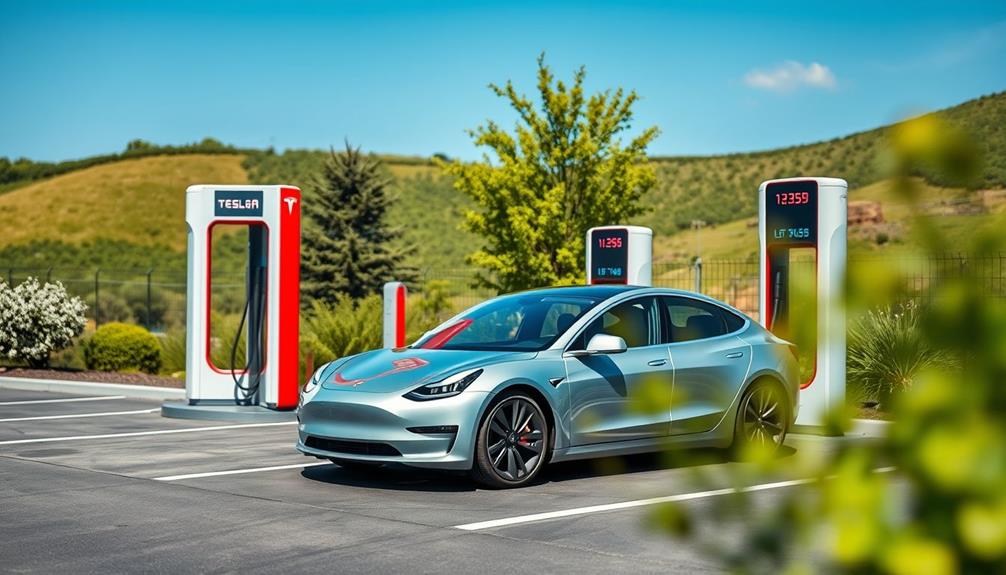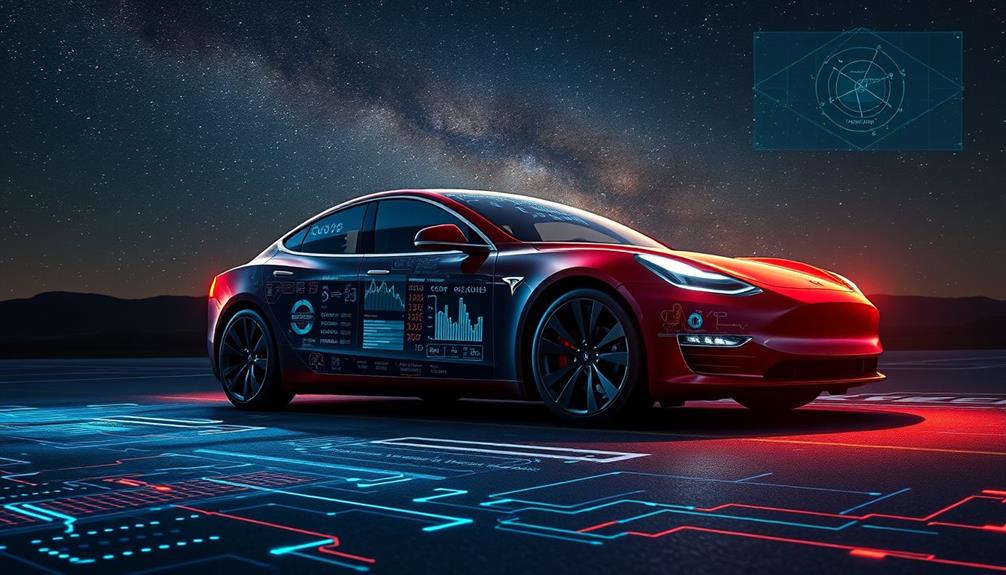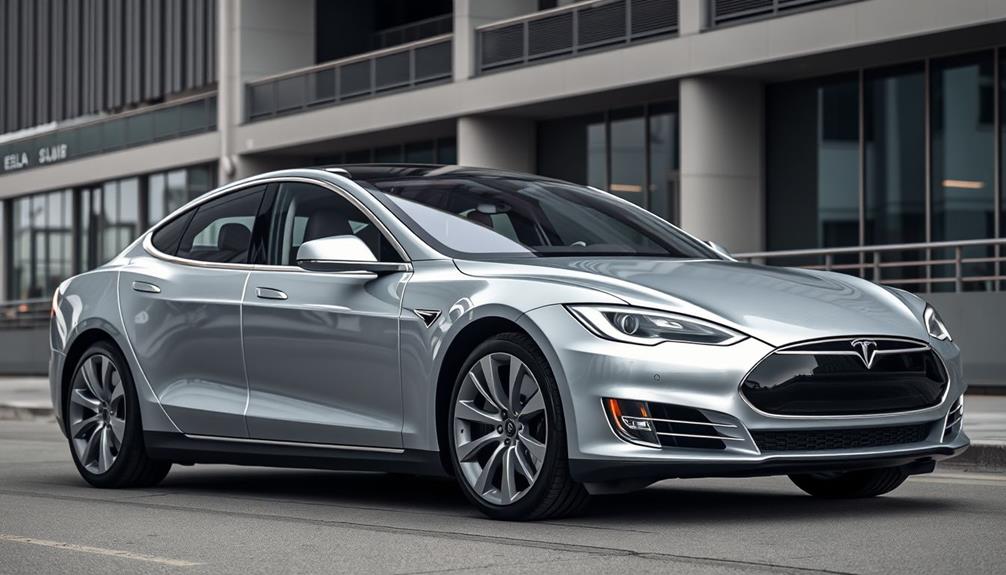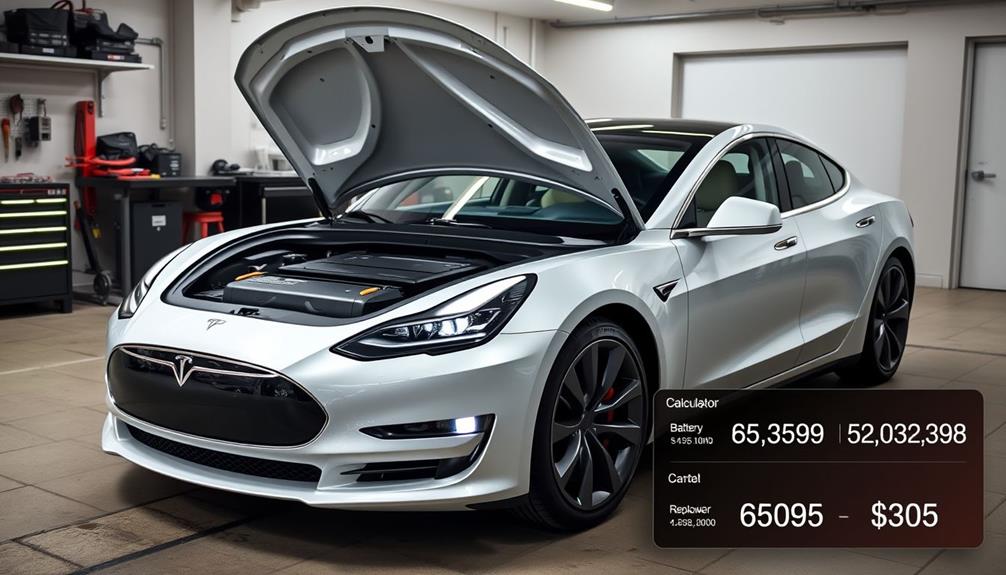Charging your Tesla at a Supercharger typically costs about $0.25 per kWh. For a full charge, expect to pay anywhere from $6 to $50, with an average costing around $27. If you're looking to cover approximately 250 miles, you'll spend between $20 and $25. Keep in mind that prices can fluctuate based on location and time of day. Charging during off-peak hours can save you even more. With several factors influencing these costs, you might be curious about ways to further optimize your charging expenses for the best value.
Key Takeaways
- Tesla Supercharger costs average $0.25 per kWh, making it approximately $20 to $25 for 250 miles of range.
- Full charging costs range from $6 to $50, depending on the vehicle model and battery size.
- Charging costs can vary based on location, with rates between $0.11 and $0.60 per kWh.
- Utilizing off-peak hours for charging can save up to 25% on electricity rates.
- Free charging options are limited; some businesses offer discounted rates through the Tesla destination network.
Overview of Charging Costs
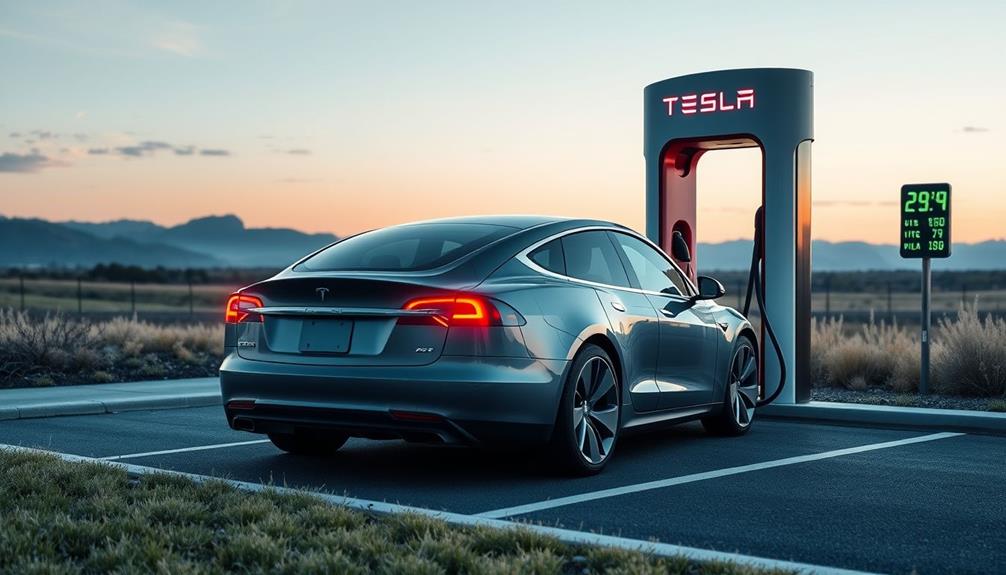
When it comes to Tesla Supercharging costs, you'll find that charging your vehicle is generally affordable. The average cost to charge at a Tesla Supercharger station is about $0.25 per kWh, which means you'll pay approximately $20-$25 for 250 miles of range.
Depending on your model and local electricity rates, full charging costs can range from $6 to $50, with the average charge costing around $27 in 2024.
If you're considering home charging, you'll likely spend less. Charging at home typically costs between $16 and $18.50 for the same 250 miles of range, making it a more economical choice.
Your annual charging costs will usually fall between $599 and $778, largely influenced by your driving habits and local electricity costs.
For instance, if you drive a Model 3 RWD, you'll benefit from these cost-saving opportunities. As of January 2023, the average electricity price in the U.S. was $0.1609/kWh, which affects your overall charging expenses.
Understanding these figures can help you budget effectively and enjoy the benefits of owning a Tesla without breaking the bank.
Factors Affecting Charging Prices
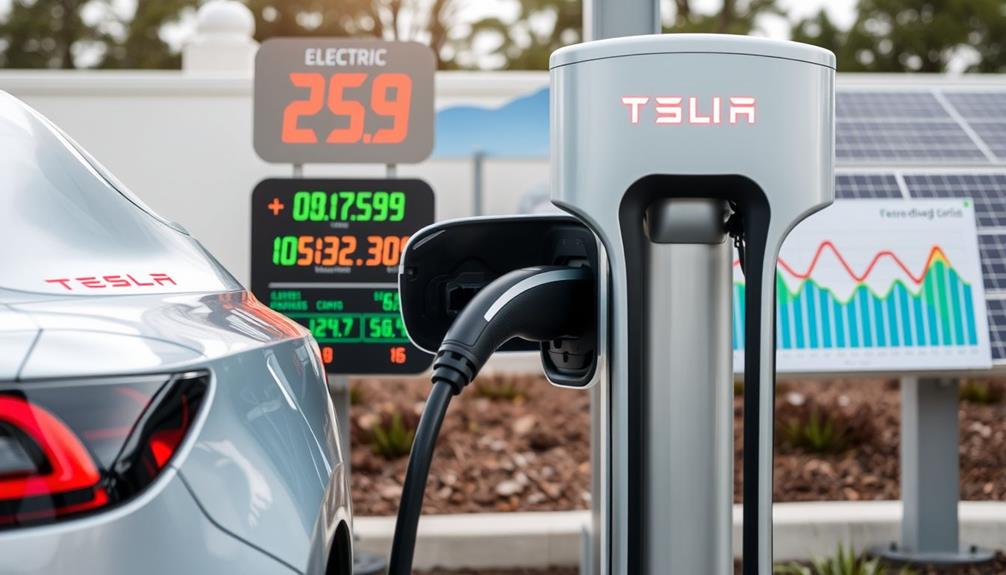
When you're charging your Tesla, the location can greatly influence the price you pay.
Rates vary from $0.11 to $0.60 per kWh, depending on where you're and the time of day.
Understanding these location-based pricing variations and time-of-day rate changes can help you save money while keeping your vehicle charged.
Location-Based Pricing Variations
Maneuvering Tesla Supercharging costs involves understanding various location-based pricing variations that can greatly impact your expenses. At Supercharger stations, charging costs can range from $0.11 to $0.60 per kWh, depending on where you are.
The average cost to fully charge your Tesla might hover around $27 in 2024, but this can vary widely from $6 to $50 based on your vehicle model and local energy costs.
State electricity rates play an important role in determining your charging costs. In the U.S., the average price per kWh typically falls between $0.10 and $0.30. Charging larger battery models, like the Model S or X, in high-cost areas can lead to expenses nearing $40 for a full charge, highlighting how location-based pricing can affect your wallet.
Additionally, while location influences prices, it's vital to keep in mind that rates may fluctuate based on demand and regional energy costs.
Time-of-Day Rate Changes
Charging costs at Tesla Superchargers aren't just influenced by location; time-of-day rate changes also play a significant role in what you'll pay.
These changes can lead to substantial price fluctuations depending on the time you choose to charge your vehicle.
Here's what you need to know about time-of-day rate changes:
- Off-Peak Rates: Charging can be as low as $0.11 per kWh during off-peak hours.
- Peak Hours: Prices can soar up to $0.60 per kWh during high-demand times.
- Time-of-Use Rates: Some Supercharger locations have different rates throughout the day, impacting your total costs.
- Local Electricity Structures: Understanding your region's electricity rates can dramatically affect your charging expenses.
Home Charging Costs
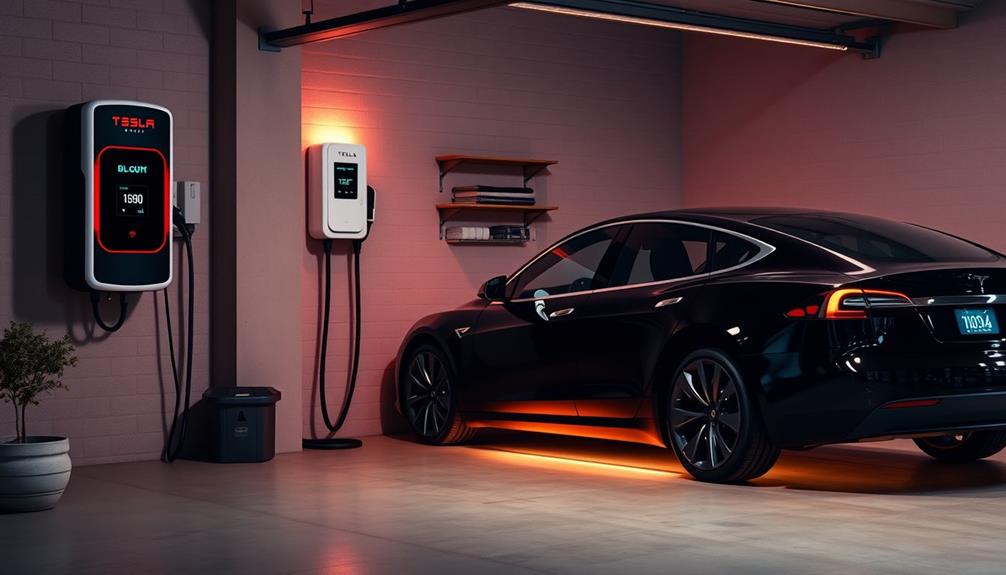
Home charging offers significant savings compared to traditional gasoline refueling, making it an appealing option for Tesla owners. When you think about home charging costs, you'll find that it's about 25% of what you'd spend on gasoline for the same distance.
On average, charging a Tesla at home ranges between $599 and $778 annually, depending on your electricity rates and the vehicle model. To achieve a full charge, it typically costs between $5 to $30, influenced by your battery size and local electricity rates. Tesla charging cost can also be affected by time of use charging rates, with off-peak hours offering lower electricity costs. Additionally, some utility companies offer special rates or incentives for electric vehicle owners, further reducing the annual cost of charging a Tesla at home. It’s important for Tesla owners to compare different electricity plans and providers to find the most cost-effective option for their charging needs.
In the U.S., the cost per kilowatt-hour averages between $0.10 and $0.30, which adds to the affordability. If you're considering investing in a home charging setup, the initial costs include a wall connector priced around $450 and installation fees ranging from $750 to $1,500.
However, you can recoup these expenses within a year thanks to lower charging costs. One of the key advantages of home charging is the ability to utilize off-peak electricity rates, which further reduces your overall charging expenses compared to public options.
Embracing home charging can lead to significant savings and convenience for Tesla owners.
Supercharger Pricing Details
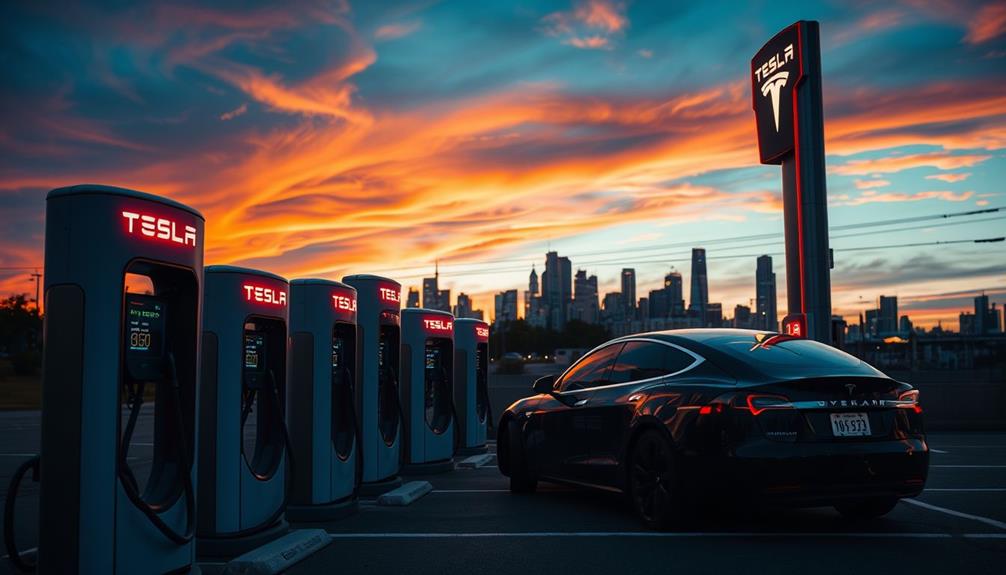
While Supercharging offers a convenient way to recharge your Tesla on the go, understanding the pricing details is essential for budgeting your charging expenses. The cost of using a Supercharger can vary greatly, impacting your overall charging budget.
Here are some key points to take into account:
- The average cost to charge at a Supercharger is about $0.25 per kWh.
- Full charges can range from $6 to $50, depending on your Tesla model, like the Tesla Model 3 RWD.
- Rates fluctuate, with some reports showing costs between $0.11 and $0.60 per kWh.
- Charging typically costs between $20 and $25 for 250 miles of range per hour, making it pricier than home charging.
Additionally, be aware of potential idle fees. If you leave your vehicle connected after charging is complete, you might incur charges of $0.50 to $1.00 per minute if the Supercharger station is at capacity.
Knowing these details helps you make informed decisions when using public charging stations, ensuring you stay within your budget while enjoying the benefits of electric driving.
Free Charging Options

If you're hoping for free charging options, you'll find that most Tesla owners can't access them right now, as the last promotions ended in 2022.
However, some businesses offer free or discounted charging through the Tesla destination network to attract customers.
You might also discover free public charging stations near supermarkets or shopping centers, so keep an eye out!
Current Free Charging Availability
Many Tesla owners find themselves without access to free Supercharging, especially since the promotional offers ended on December 31, 2022.
While you might've enjoyed free Supercharging in the past, it's important to explore your current charging options.
Here are some alternatives you might consider:
- Public Charging Stations: Some businesses and stations offer free charging, especially near community services.
- Charging at Home: If you have a home charging setup, this can be a cost-effective way to power your Tesla.
- Check for Promotions: Log into your Tesla account or contact customer service to see if any new promotions for free Supercharging are available.
- Future Access: Tesla plans to expand the Supercharger network to non-Tesla electric vehicles, which could increase overall charging options, though free charging isn't guaranteed.
Owning a Tesla now means relying more on the Supercharger network and public charging stations.
While free Supercharging is limited, knowing your options empowers you to make the best choices for your charging needs.
Staying informed will help you navigate the changing landscape of Tesla charging.
Historical Free Charging Promotions
The landscape of Tesla's Supercharging options has changed considerably over the years, particularly regarding free charging promotions. Historically, many Tesla owners enjoyed free Supercharging through various promotions, which often provided Supercharging credits tied to specific models or limited-time offers.
These promotions made it easy for you to charge without worrying about costs, enhancing the appeal of the Tesla charging network.
However, that landscape shifted dramatically when the last free Supercharging promotion ended on December 31, 2022. Now, free charging isn't guaranteed for new Tesla models, and whether you can benefit from any free Supercharging depends on your individual purchase agreement.
This change has led many Tesla owners to adapt their charging habits, relying more on home charging solutions or public charging networks.
While free Supercharging is no longer standard, you might still find occasional promotions. To stay informed, check your Tesla account or contact customer service for potential offers.
As charging costs evolve, understanding these historical promotions can help you navigate your options effectively while managing your charging expenses.
Charging Speed and Efficiency
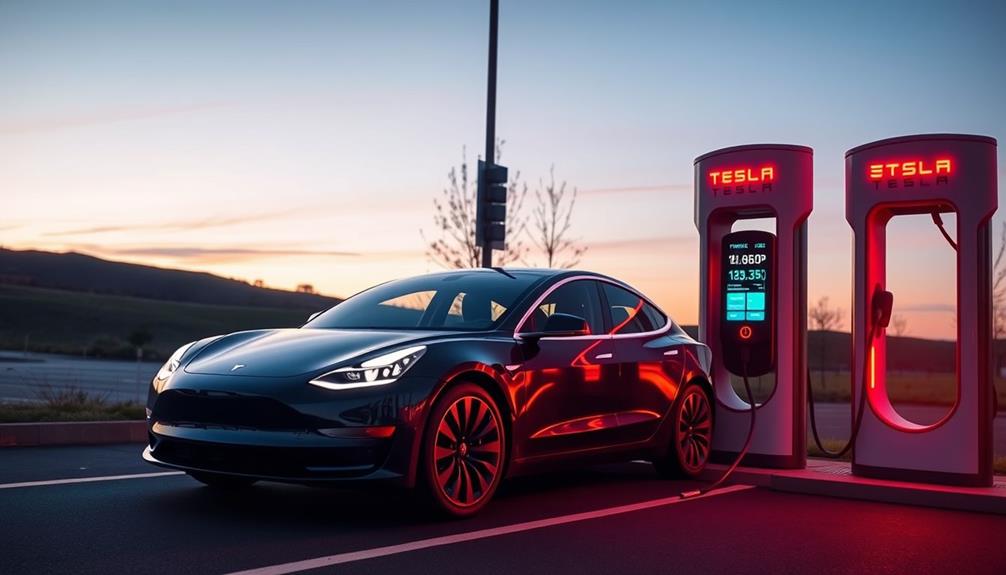
While charging speeds at Tesla Superchargers can vary, you can expect impressive efficiency that makes long-distance travel convenient.
With the ability to charge up to 200 miles of range in just 15 minutes, you'll find that these stations are designed for speed and practicality.
Here's what you can expect from Tesla Supercharging:
- Charging Speed: Superchargers can reach up to 250 kW, delivering a full charge for long-range models in about 30 minutes.
- DC Electricity: Utilizing direct current, Superchargers bypass the onboard charger, allowing for faster charging compared to standard AC plugs.
- Model Variability: The efficiency of charging can differ based on your Tesla model and battery capacity, with some vehicles charging quicker than others.
- Home Charging: It's recommended to balance Supercharging with home charging to optimize battery health and manage the cost of charging over time.
Idle and Congestion Fees
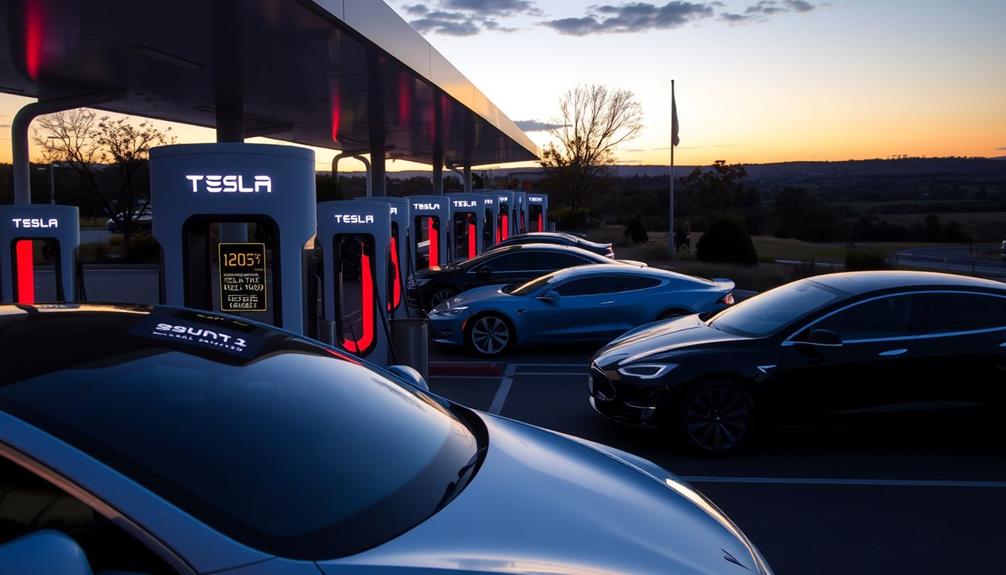
Have you ever wondered what happens if you leave your Tesla plugged in too long after charging? At Tesla Supercharger stations, you could incur idle fees ranging from $0.50 to $1.00 per minute if your vehicle remains connected after reaching the charge threshold.
These fees kick in only when the Supercharger station is at least 50% full, and they double to $1.00 per minute when the station hits full capacity. Fortunately, you get a five-minute grace period to move your vehicle before these charges apply.
Additionally, congestion fees may also affect you. If your battery is above 80% during peak hours, you could incur $1.00 per minute in congestion fees, promoting efficient use of the charging stations.
To keep you informed, any incurred charges—whether idle or congestion—are sent directly to your Tesla app. This way, you can monitor your charging status and avoid unnecessary costs.
Comparing Tesla to Gas Vehicles
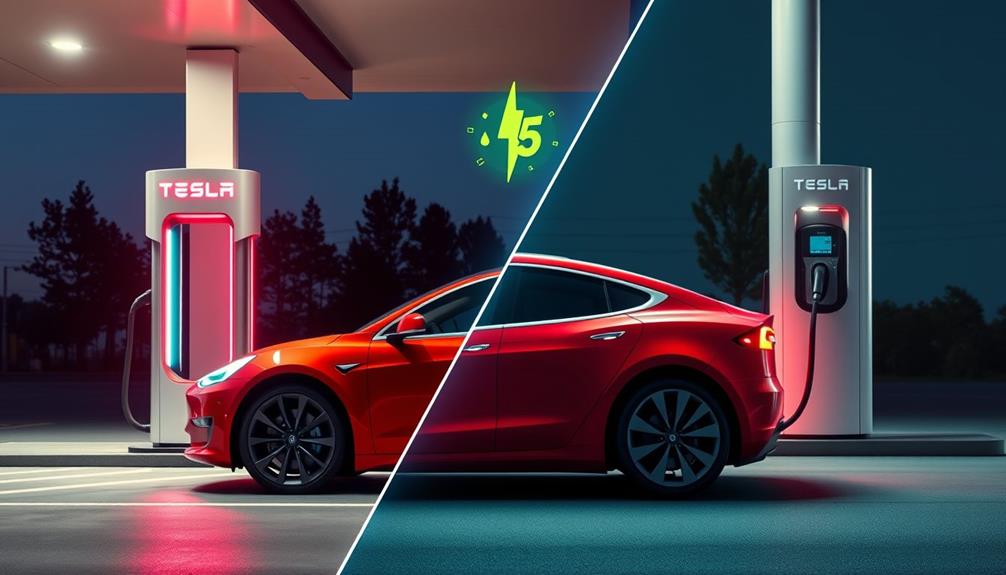
Understanding the costs associated with charging your Tesla reveals just how much more economical it can be compared to fueling a gas vehicle. If you own a Model Y or any Tesla, you'll likely notice significant savings over time.
Here's a quick comparison of costs:
- Charging Costs: Tesla Supercharging averages around $0.25 per kWh, costing about $22 for a 250-mile range.
- Gas Prices: Refueling a gas vehicle for the same distance can be substantially higher depending on local gas prices.
- Annual Expenses: Average annual charging costs for a Tesla range from $599 to $778, while gas vehicle owners often spend much more.
- Battery Capacity: A full charge for a Tesla with a 100 kWh battery pack costs around $18.40, highlighting the efficiency of electric vehicles.
With the average electricity cost in the U.S. sitting at about $0.1609 per kWh, charging a Tesla isn't just convenient but also cost-effective.
Making the switch means you'll enjoy lower fueling costs while contributing to a greener future.
Charging With Solar Power
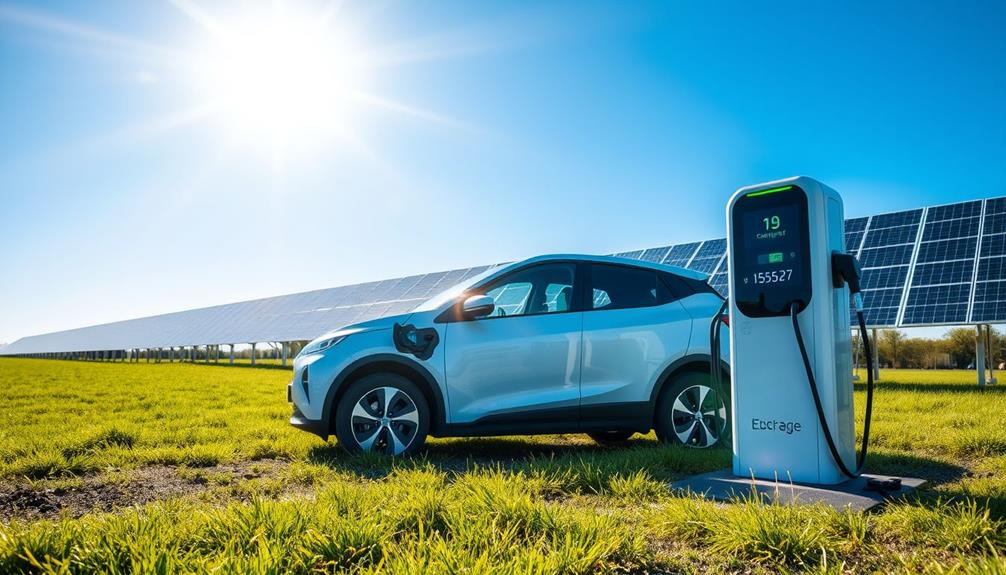
Charging your Tesla with solar power can save you a significant amount on energy costs, averaging just $0.06 per kWh.
With the right setup, you could potentially save around $1,500 each year compared to relying on Superchargers.
To effectively power your Model 3, you'll need about five solar panels, depending on your usage and location.
Cost Savings Analysis
The financial benefits of powering your Tesla with solar energy are compelling and can lead to significant savings. Instead of relying on Supercharging stations, you can drastically reduce the costs to charge your vehicle. Charging your Tesla with solar power can bring your cost down to about $0.06 per kWh, a sharp contrast to typical Supercharging rates.
By making the switch, you could enjoy:
- Annual savings of around $1,500
- Lower energy costs, as solar energy is typically cheaper
- A reduced carbon footprint, benefiting the environment
- Energy independence from traditional charging networks
For a Tesla Model 3, you'd need roughly five solar panels to cover its average energy consumption of about 4 miles per kWh.
Plus, you'll need a solar inverter to convert the generated energy into usable power for charging your Tesla at home. This setup not only helps you save money but also aligns with eco-friendly practices—making your driving experience not just cost-effective but sustainable, too.
Embracing solar power for your Tesla can transform how you think about energy and vehicle charging.
Solar Panel Requirements
When considering solar power for your Tesla, it's vital to determine how many solar panels you'll need to meet your charging needs. For a Tesla Model 3, you'll typically need around five solar panels, though this can vary based on your driving habits and geographic location.
With energy consumption averaging about 4 miles per kWh, you can estimate how much energy you'll require based on your annual mileage.
Using solar power greatly reduces your charging costs, averaging just $0.06 per kWh compared to as much as $0.60 at Superchargers. To make the most of this savings, you'll also need to install a solar inverter. This device converts the direct current (DC) generated by your solar panels into alternating current (AC) power, which is essential for home charging.
To get an accurate assessment of your specific needs, it's wise to consult with a local solar installer. They can help you evaluate your energy consumption and sunlight exposure, ensuring you get the right number of solar panels to efficiently charge your Tesla while maximizing your investment in solar power.
Tips for Reducing Charging Costs
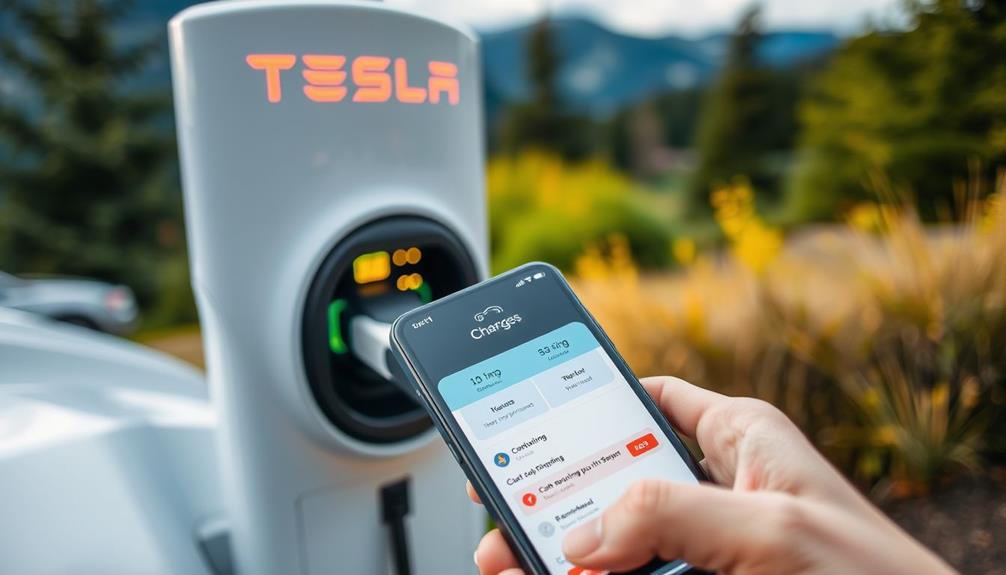
Reducing charging costs for your Tesla is easier than you might think. By implementing a few smart strategies, you can considerably cut down on your expenses.
Here are some tips to help you charge a Tesla without breaking the bank:
- Charge at home during off-peak hours: Electricity rates are often lower during these times, potentially saving you up to 25% compared to public charging.
- Utilize Tesla's Supercharger network wisely: Charge when demand is lower, as rates can vary from $0.11 to $0.60 per kWh based on the time of day and location.
- Explore free charging options: Many supermarkets, shopping centers, and public stations offer free charging, which can greatly reduce your overall costs.
- Consider installing a solar system: This can bring your charging costs down to around $0.06 per kWh, saving you up to $1,500 annually compared to using Superchargers.
Frequently Asked Questions
How Much Does It Cost to Fully Charge a Tesla on a Supercharger?
When you fully charge your Tesla at a Supercharger, it typically costs around $27. However, this can vary between $6 and $50 based on your vehicle model and local charging rates. Plan accordingly!
Is It Cheaper to Charge a Tesla at Home or Supercharger?
Charging your Tesla at home's usually cheaper than using a Supercharger. You save money by taking advantage of off-peak rates and avoiding higher Supercharger fees, making home charging the more economical choice for daily use.
Is It Cheaper to Charge at a Tesla Supercharger at Night?
Imagine the calm of night; charging your Tesla then can save you money. You'll benefit from lower rates, as Supercharger prices often drop during off-peak hours, making it a smart choice for your wallet.
Is Supercharging Profitable for Tesla?
Yes, supercharging's profitable for Tesla. You'll notice the steady demand and high usage across their extensive network, which not only generates revenue but also enhances customer loyalty, making it a smart business strategy.
Conclusion
In the grand journey of electric driving, understanding Tesla supercharging costs is like traversing a treasure map. By considering factors like home charging and free options, you can reveal significant savings. Just like Odysseus found his way home through clever choices, you too can reduce your expenses and charge efficiently. Embrace solar power and stay mindful of fees, and you'll find that charging your Tesla can be as smooth as a well-oiled machine. Happy driving!
